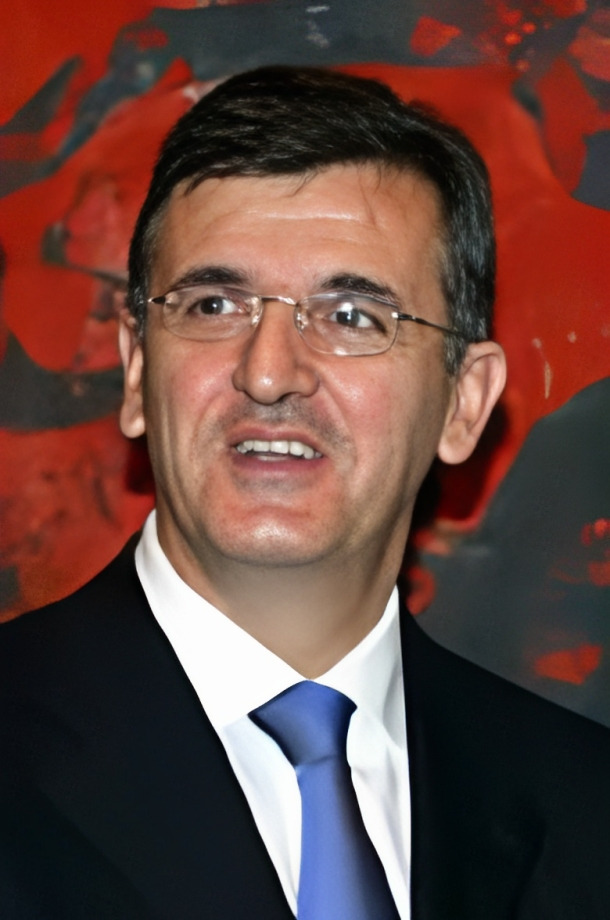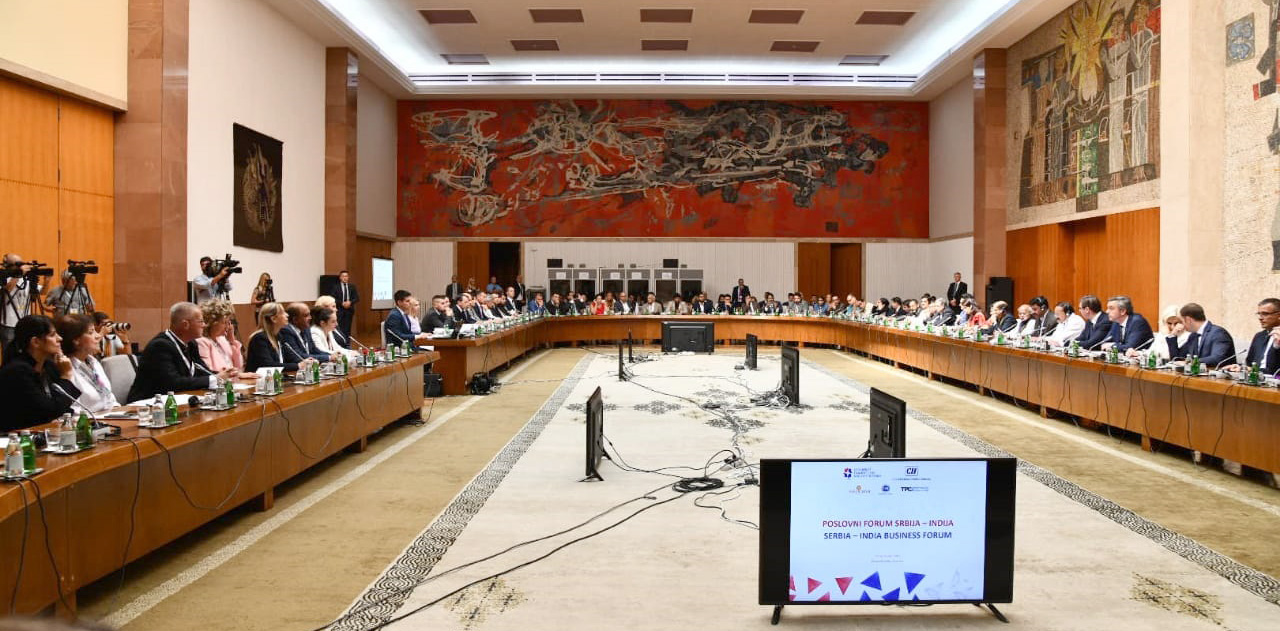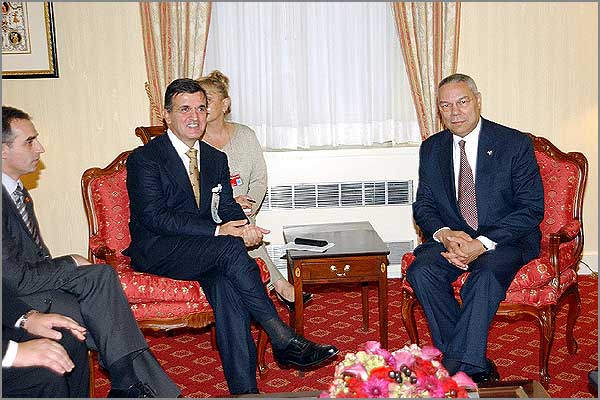1. Overview

Svetozar Marović is a Montenegrin lawyer and politician who served as the last head of state and head of government of Serbia and Montenegro from 2003 until Montenegro's declaration of independence in 2006. His political career, marked by a significant rise during the Anti-bureaucratic revolution and a long tenure within the Democratic Party of Socialists (DPS), was ultimately overshadowed by extensive corruption allegations. He made notable diplomatic efforts, including public apologies for past conflicts, but later faced charges, admitted guilt, and fled to Serbia, leading to an ongoing extradition dispute. In 2022, he was designated for sanctions by the United States Department of the Treasury.
2. Early life and education
2.1. Birth and background
Svetozar Marović was born on March 31, 1955, in Kotor, Yugoslavia. Although he was born in Kotor because it was the nearest coastal city with a maternity clinic, he considers Budva his hometown, where he was raised. His parents were Jovo Marović and Ivana Marović (née Pavić), with his father originating from the Grbalj region. As Marović's political career advanced, his extended family became one of the wealthiest in Budva.
2.2. Education
Marović completed his elementary and high school education in his hometown of Budva. He then pursued higher education, earning a law degree from the Faculty of Law at Veljko Vlahović University in Titograd (now known as Podgorica).
3. Early political career
Marović's early political career saw him engage in local governance and youth organizations, playing a role in significant political shifts in Montenegro.
3.1. Local politics and youth organizations
Marović began his career as a paralegal within the local parliament of Budva. He quickly ascended through youth political organizations, serving as president of the Socialist Youth Union of Budva before becoming the president of the Socialist Youth Union of Montenegro. During this period, he garnered attention for holding an outdoor meeting of the presidency where he openly criticized the entrenched old guard of the ruling party. He also caused controversy by publishing a brochure titled "Stop Electoral Fraud" in 1984, which highlighted his early reformist tendencies.
Following his dismissal from Titograd, Marović returned to Budva, where he took on the role of Administrator of Public Revenues before eventually becoming the president of the local government. In this capacity, he played a crucial role in the renovation efforts of Budva after the devastating 1979 Montenegro earthquake. A notable initiative during his tenure was the establishment of the "Theatre City Budva" project in 1987, a cultural endeavor he co-founded with theatre director Ljubiša Ristić.
3.2. Role in the Anti-bureaucratic Revolution
In January 1989, Svetozar Marović, alongside his political partners Momir Bulatović and Milo Đukanović, orchestrated an administrative putsch within the League of Communists of Montenegro, effectively seizing power in the Socialist Republic of Montenegro. This event, which occurred with the implicit support of Serbian Communist leader Slobodan Milošević, became widely known as the "Anti-bureaucratic revolution". Marović's participation in this significant political upheaval followed his resignation from his position as president of the local government in Budva.
After the first multi-party 1990 Montenegrin general election in 1990, where the League of Communists of Montenegro (SKCG) secured a majority, Marović became a member of the Montenegrin parliament. A few months after their electoral victory, the SKCG underwent a transformation and was rebranded as the Democratic Party of Socialists (DPS).
4. Political rise and party leadership
Marović's ascent within the Montenegrin political landscape was closely tied to the rise of the Democratic Party of Socialists and his parliamentary roles.
4.1. Leadership in the Democratic Party of Socialists (DPS)
Svetozar Marović was a co-founder of the Democratic Party of Socialists (DPS), which emerged from the rebranded League of Communists of Montenegro. He quickly rose through the party ranks, serving as the party secretary and later becoming the vice-president of the ruling party. For over 15 years, Marović was a steadfast and loyal supporter of Milo Đukanović's policies. In 1997, he notably followed Đukanović in a significant political split, breaking away from the influence of Slobodan Milošević.
4.2. Parliamentary career
Marović had a prominent career in the Montenegrin parliament, serving as Speaker of the Montenegrin Parliament for three terms, specifically from 1995 to 2001. During this period, he also held a seat as a member of the lower house of the Yugoslav Federal Assembly. His political ambitions extended to higher offices; he unsuccessfully ran for president of the Federal Republic of Yugoslavia in 1992. Later, in 1997, he was nominated by the Democratic Party of Socialists for the Montenegrin presidency but was defeated by Milo Đukanović.
5. Corruption allegations
Marović's political career was marked by significant accusations of corruption, particularly regarding his alleged involvement in illicit activities during the 1990s.
5.1. Accusations by Momir Bulatović
In 2001, Momir Bulatović, a former Montenegrin president and Marović's former party colleague, published a tell-all memoir titled Pravila ćutanja (The Rules of Keeping Silent). In his book, Bulatović accused Marović, among others, of accepting substantial financial compensation in exchange for deliberately overlooking widespread oil and tobacco smuggling operations in Montenegro throughout the 1990s. Despite their past close friendship and an intimate bond through godfather relations between their families, the two had not spoken for nearly a decade at the time of the book's release.
Bulatović recounted a private conversation from the 1990s where he confronted Marović about the alleged corruption. He quoted Marović's response: "You see, Momir, you're the first ever President of Montenegro, that's the legacy you're passing on to your children. Me, I want something more concrete to leave my kids with." Marović never directly addressed these specific claims, stating only that he had not read the book and adding that he was taught "the rule of keeping silent about untruth and slander."
6. Presidency of Serbia and Montenegro (2003-2006)

Marović's presidency of Serbia and Montenegro was characterized by complex political dynamics, efforts towards regional reconciliation, and a significant corruption scandal.
6.1. Role as Head of State and Government
On March 7, 2003, Svetozar Marović was elected as the first President of Serbia and Montenegro, serving as the last head of state and government of this loose state union until Montenegro's declaration of independence on June 3, 2006. His position was inherently complicated and somewhat paradoxical. The DPS, Marović's own political party, was the leading force behind the Montenegrin separatist movement, and his party president, Milo Đukanović, was a prominent Montenegrin nationalist actively seeking to dissolve the union. This made it challenging for Marović to reconcile the views and objectives of his party with his official duties to uphold the interests of the state union in his role as president.
6.2. Diplomatic apologies and reconciliation
Marović's term as President of Serbia and Montenegro notably involved significant efforts towards reconciliation with Croatian and Bosnian citizens. On September 10, 2003, during a state visit by Croatian President Stjepan Mesić to Belgrade, Marović delivered a public apology for "all evils done by any citizen of Montenegro and Serbia to anyone in Croatia". Mesić reciprocated with a counter-apology to "anyone whom citizens of Croatia caused any pain or damage, anytime, anyplace." This apology from Marović was particularly significant as it stood in stark contrast to his earlier views from the early 1990s, when he coined the infamous phrase "war for peace" to justify the Montenegrin reservists' assault on Dubrovnik and Konavle in 1991.

On November 13, 2003, Marović visited Sarajevo and issued another apology, this time to the citizens of Bosnia and Herzegovina on behalf of Serbia-Montenegro, for "any evil or calamity that anyone in Bosnia-Herzegovina suffered at the hands of anyone from Serbia-Montenegro." Unlike Mesić's reciprocal apology in Croatia, Marović's hosts in Sarajevo, members of Bosnia's three-man rotating Presidency, did not offer a similar apology in return.
6.3. Military equipment scandal
In September 2005, a major military equipment scandal erupted, implicating Marović. On September 1, 2005, Serbian Minister of Finance Mlađan Dinkić publicly exposed a military contract signed by Svetozar Marović. This contract was a five-year agreement between Serbia-Montenegro's Council of Ministers and the Mile Dragić Company of Zrenjanin, outlining the supply of equipment to the Army of Serbia-Montenegro (VSCG) for the period between 2006 and 2011. Dinkić revealed that the contract included highly inflated orders, such as 69,000 helmets and over 60,000 body armor suits for an army that numbered only 28,000 personnel, and 500 fighter pilot jackets for a fleet of barely 30 planes.
While the primary responsibility for the scandal was directed at Minister of Defense Prvoslav Davinić, Marović was criticized for signing and thereby legitimizing such an evidently inflated contract, which would ultimately cost the taxpayers of Serbia 296.00 M EUR. After a budget commission confirmed Dinkić's allegations, he further stated on September 15, 2005, that "it's completely clear Marović and Davinić were fully in the know about everything that went on," and also implicated several other defense ministry and army officials.
Davinić eventually resigned, and the damaging contract was revoked. However, Marović responded with a written statement, accusing Dinkić of "libel and destroying state union's institutions." He asserted his full responsibility as the state union's president, stating, "They should not blame anybody, they should not sue anybody, and they should not judge anybody - but me. Because of that, they should submit everything they have against me. But neither to their party investigators, nor to domestic courts they're squeezing with their temporary ministerial careers. Let them submit everything they have and more to the best, most experienced, most competent, highest paid and best regarded European and world investigators and courts and they will get an answer - that Svetozar Marović is a clean and honest man." In the days following, members of Marović's cabinet, Montenegrin regime officials, and even Prime Minister Milo Đukanović threatened to withdraw all Montenegrin staff from Belgrade in protest.
Once the immediate tensions subsided, Dinkić announced that the "budget inspection met many obstructions within Ministry of Defense during the investigation" but was determined "to close the issue and put on trial those who are responsible." While Dinkić was less clear on whether Davinić and Marović would be included, he agreed that the "prosecutor's office should go as high up the chain of command as necessary."
6.4. Stance on Montenegrin independence
During his presidency, Marović found himself in the unique position of being the head of a state union while simultaneously supporting its dissolution. His political party, the DPS, actively advocated for the full independence of Montenegro. Consequently, Marović campaigned for a "yes" vote in the 2006 Montenegrin independence referendum. Following the successful passage of the referendum, Marović announced that on June 1, 2006, he would "hold the last session of the Council of Ministers and resign... from the post of the president of the state union," effectively overseeing the end of the state he led.
7. Post-presidency and later political activities
After his presidency, Marović remained active in Montenegrin politics, particularly within his party and in constitutional reforms.
7.1. Continued role within the DPS
In 2007, Svetozar Marović was re-elected as the vice-president of the Democratic Party of Socialists (DPS), indicating his continued influence within the ruling party. During the period of conflicts between the Serbian Orthodox Church and the uncanonical Montenegrin Orthodox Church, Marović publicly expressed his support for the Serbian Orthodox Church, recognizing it as the legitimate religious institution.
7.2. Involvement in constitutional negotiations
In October 2007, Marović played a crucial role by leading the negotiating team for the DPS-SDP coalition, aiming to reach a consensus on the new Constitution of Montenegro. The negotiations resulted in several key agreements. It was decided that the official language of Montenegro would be named "Montenegrin," with both Latin and Cyrillic scripts recognized as official. Additionally, Serbian, Bosnian, Albanian, and Croatian were recognized as minority languages. The constitution also stipulated that Montenegro would be defined as the state of the Montenegrin people, while explicitly mentioning Serbs, Bosniaks, Albanians, and Croats within the constitutional text. Furthermore, the agreement established a clear separation of church and state, with neither being mentioned in the constitution. A significant point of contention resolved was the issue of dual citizenship: Montenegrin citizens would generally not be allowed to hold dual citizenship, but those who possessed multiple citizenships before the adoption of the Declaration of Independence would be permitted to retain them. This provision effectively meant that Montenegrins residing in Serbia would be unable to acquire dual citizenship after the new constitution came into force.
8. Corruption charges, arrest, and exile
Marović's post-presidency period was dominated by a significant corruption scandal that led to his arrest, admission of guilt, and subsequent flight from Montenegro.
8.1. Arrest and legal proceedings
On December 15, 2015, Svetozar Marović, who was then the Deputy President of the ruling Democratic Party of Socialists, was arrested in Montenegro. The arrest was in connection with a long-running corruption case centered on his hometown of Budva. The Montenegrin prosecutor's office publicly identified him as the "head of the Budva criminal group," an accusation that Marović later admitted to in court. Subsequently, on August 18, 2017, the assets belonging to his family were frozen as part of the ongoing legal proceedings.
8.2. Flight to Serbia and extradition disputes
Before he was formally found guilty in 2017, Svetozar Marović fled Montenegro to neighboring Serbia, citing the need for psychiatric treatment in Belgrade. He has since resided in Serbia, evading Montenegrin legal proceedings. Montenegro has repeatedly and persistently requested his extradition from Serbia to face justice for the corruption charges. However, Serbia has not complied with these requests, leading to ongoing diplomatic and legal disputes between the two nations regarding his return.
8.3. Public criticism of former party leadership
In August 2020, Marović broke his silence for the first time since fleeing to Belgrade. He publicly accused the leadership of the party he co-founded, the Democratic Party of Socialists (DPS), of widespread corruption, nepotism, partocracy, and authoritarianism. Specifically, he accused Milo Đukanović, the then-President, of orchestrating and rigging the corruption process against him and members of his family. Marović also publicly supported Bishop Amfilohije Radović and the 2019-2020 clerical protests in Montenegro. Furthermore, he endorsed the opposition parties in the 2020 Montenegrin parliamentary election, which ultimately resulted in a victory for the opposition, marking a significant shift in Montenegrin politics.
9. Sanctions and international recognition
9.1. US Treasury designation
In April 2022, Svetozar Marović was included on the US Treasury's Specially Designated Nationals List. This designation is part of a broader set of Balkans-related sanctions, indicating that the United States government has identified him as a target for financial restrictions due to his alleged involvement in corruption and actions deemed detrimental to stability in the region. The inclusion on this list signifies a significant international recognition of the corruption charges against him.
10. Personal life
10.1. Family and relationships
Svetozar Marović is married to Đina Prelević. Together, they have two adult children: a son named Milos and a daughter named Milena. His son, Milos Marović, is a professional volleyball player who played for the Budvanska Rivijera team. Milos gained public attention in early 2006 when he was involved in a brawl that erupted during a New Year's Eve celebration at the Trocadero nightclub in Budva, an incident that occurred while Croatian singer Severina Vučković was performing.
11. Legacy and assessment
11.1. Historical and political impact
Svetozar Marović's political career leaves a complex and largely tarnished legacy on Montenegro's political landscape, governance, and public trust. Rising to prominence during the tumultuous "Anti-bureaucratic revolution" of the late 1980s, he was a key figure alongside Milo Đukanović and Momir Bulatović in reshaping Montenegrin politics from a communist system to a multi-party democracy. As a co-founder and long-serving vice-president of the Democratic Party of Socialists (DPS), he was central to the party that dominated Montenegrin politics for decades. His loyalty to Đukanović, particularly during the split from Slobodan Milošević's influence, underscored his strategic political alignment.
His unique position as the last President of Serbia and Montenegro, while simultaneously advocating for Montenegrin independence, highlights a period of profound national redefinition. His diplomatic apologies to Croatian and Bosnian citizens were significant gestures towards regional reconciliation, offering a stark contrast to his earlier rhetoric during the Yugoslav Wars. These actions were seen by some as a positive step towards healing past wounds and fostering better relations in the post-Yugoslav space.
However, Marović's legacy is profoundly marred by persistent and ultimately proven corruption allegations. The accusations raised in Momir Bulatović's memoir in 2001, detailing alleged involvement in smuggling, foreshadowed later, more concrete charges. The military equipment scandal during his presidency, which saw him implicated in a grossly inflated contract costing taxpayers 296.00 M EUR, severely damaged his reputation and raised serious questions about financial mismanagement and accountability at the highest levels of government. His subsequent arrest in 2015, his admission of guilt as the "head of the Budva criminal group," and his flight to Serbia to evade imprisonment represent a significant blow to public trust in governance and the rule of law in Montenegro. The ongoing extradition dispute with Serbia further complicates his image, portraying him as a figure who evaded justice. His later public criticism of the DPS leadership, accusing them of corruption and authoritarianism, is ironic given his long tenure and high-ranking position within the very party he criticized, raising questions about the timing and motivation of his accusations. Ultimately, Marović's career serves as a cautionary tale of a powerful political figure whose contributions to nation-building were overshadowed by a severe lack of accountability and integrity.